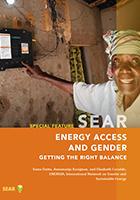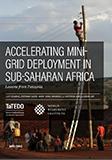Publications
More than 1.1 billion people globally lack access to electricity, and 2.9 billion lack access to clean cooking fuels. Why does gender matter in access to energy services? One focus of the gender, energy, and poverty narrative has been that since women play a significant role in energy systems as part of their subsistence and productive tasks, they are disproportionately affected by energy shortages. In recent years however, there is a growing awareness that energy, as a critical enabler to development, can also play a transformative role in the lives of men and women by enhancing their productivity and effectiveness at home and at work. Men and women differ in the purposes for which they need and use energy and in their levels of access. This paper explores the linkages between gender, energy, and poverty and the empirical evidence on these linkages - with an emphasis on electricity and cooking energy. It also reviews global experience on what strategies and approaches have been employed to integrate a gender perspective in energy, what results have been achieved, and good practices and lessons learned.
Dutta, Soma; Kooijman, Annemarije; Cecelski, Elizabeth W. 2017. Energy Access and Gender: Getting the Right Balance. Washington, D.C.: World Bank Group. http://documents.worldbank.org/curated/en/463071494925985630/Energy-access-and-gender-getting-the-right-balance


